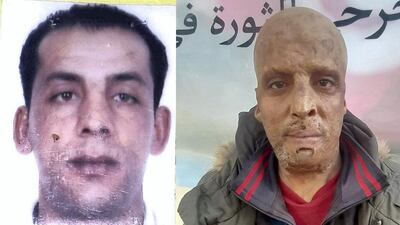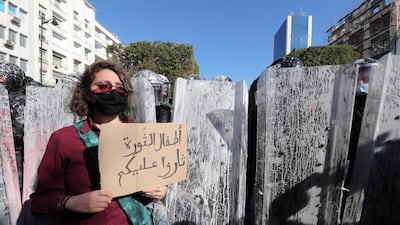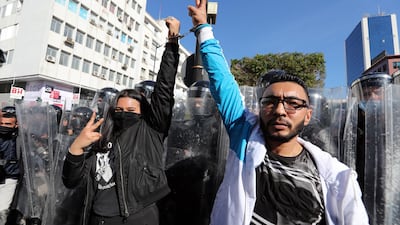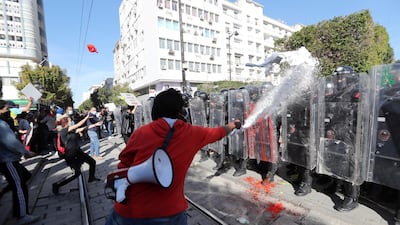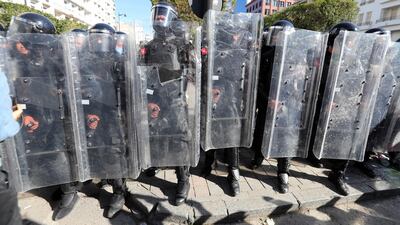In a small flat in the Tunisian city of Kasserine, there was a double tragedy.
Two brothers separately set themselves on fire in protest at deteriorating social conditions.
In 2011 one survived after onlookers saved him, although he was left with severe burns that scarred his face, hands, legs, neck and chest.
The other died in 2015, shortly before his 35th birthday.
Hosni Qelieh, now 48, tried but could not get used to the change in his appearance over time.
"Every day I almost cry, ever since this fateful incident. Today I'm jobless, helpless and can't afford the treatment. I wish I had died," Mr Qelieh told The National. He was speaking while taking part in anti-government strikes this week in Tunis.
Among the protesters there were others who survived self-immolations, as well as victims of police violence during the revolution that ousted Zine El Abidine Ben Ali from the presidency a decade ago. Some of them were badly injured and now live with disabilities.
They were protesting against what they perceive as the failure of the state for leaving them without proper care or compensation for their injuries.
Years without hope
Mr Qalieh has been poor his whole life, growing up in the city of Kasserine.
The town is in a governorate remembered by some as the site of a well-known battle between US forces and the Germans during the Second World War.
But today, the troubled city has become a symbol of economic disparity between the interior and the coast, in a country of more than 11 million people.
In 1989, Mr Qalieh dropped out of high school and stayed jobless for most of his twenties. His contemporaries read news reports of rare cases of suicide by fire in his country. But few expected self-immolation to become common after 2011.
Globally, the World Health Organisation reports an average of 800,000 suicides a year, or one every 40 seconds.
In Tunisia after the revolution, suicides are not underreported because burials take place only after an autopsy of the body, as in many Arab countries. In the social media era, the very obvious cause of death happens in real time.
Unemployment and deplorable economic conditions are still the leading cause of suicide in Tunisia. Data on suicide and attempts in 2020 shows that out of 235 cases, 174 were men and 61 were women, in the 16 to 45-year-old age group, according to the latest report by the non-government Tunisian Social Observatory (OST).
Unofficial statistics estimate that more than 2,000 Tunisians took their own life or attempted suicide since December 2010 when Mohamed Bouazizi set himself ablaze before the governorate building in Sidi Bouzid.
Bouazizi was protesting against police ill treatment, after he was singled out for being an illegal street vendor. Mr Bouazisi's self-immolation was broadly seen as a catalyst for the subsequent Arab uprisings.
The young Tunisian was soon imitated by other Tunisians, including Mr Qalieh, suicidal acts of protest over unemployment and police abuse.
“I copied the same mistake,” he said, recalling the fateful day in January, 2011. “I was humiliated, insulted and badly beaten by policemen in Sousse [south of Tunis] as I was protesting at their making fun at me as a security guard.
“I clashed with one of them who started it all, grabbed him as he insulted my mother but they overpowered me. I was so desperate and suffering from severe bouts of depression as my brother self-immolated himself when he was 35, after being refused work by many employers,” he said.
“Four days later, I actually decided to go to the police and set myself ablaze, as well as them, but they narrowly escaped as a passing truck shielded them from the fire.
"I survived after an ambulance moved me to the main burns hospital in the capital Tunis with third-degree burns,” he recalled.
A lost decade
Tunisia was hailed as the success story of the Arab uprisings for the progress it made in sustaining democracy and human rights, but it has struggled for the past 10 years to revive its economy and deal with a growing sense of frustration and alienation in the street. An unwieldy power-sharing arrangement has not helped the situation, and the government has been less than nimble pursuing reforms.
The country has been led by eight governments since the downfall of the country’s long-time leader Ben Ali, but the issues affecting a large section of society have barely changed.
The OST says the country's unemployment rate rose to 18 per cent by end of last year, mainly a result of the pandemic.
Protests and strikes are a fixture of daily life in impoverished cities like Kasserine, the birthplace of Mr Qalieh. In the capital Tunis, dozens of young men recently defied Covid-19 curfew orders at night to battle with police in some of the poorest neighbourhoods.
Hundreds were injured and arrested and at least one died in last month’s clashes. More disaffected young men have threatened to self-immolate on the 10th anniversary of Bouazizi’s death.
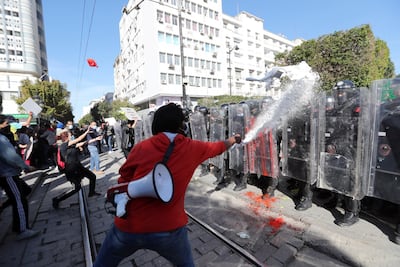
But hardly anyone is paying attention, Samah Mouzghi, 25, from Kasserine, told The National, echoing the opinions of many Tunisians.
Ms Mouzghi believes that many people suffer from compassion fatigue, leaving them too emotionally and mentally exhausted to empathise with those who set themselves alight.
“We are no longer shocked by such an act. We used to care and feel compassion for them in the early years of our revolution but I can’t for the life of me praise anyone as a hero after doing this to him or herself,” she said.
“We don’t care about such news any more. Life goes on,” Ms Nouzghi said, consumed by an endless search for a job, four years after her graduation from university.
